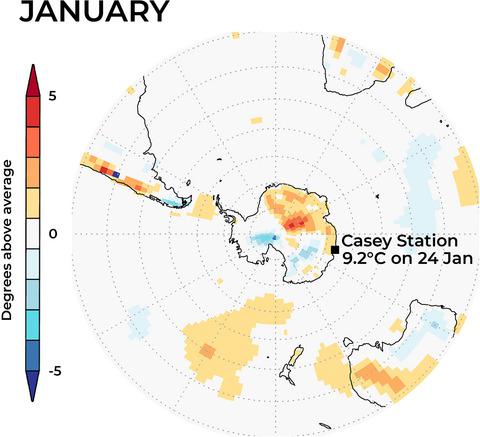当前位置:
X-MOL 学术
›
Glob. Change Biol.
›
论文详情
Our official English website, www.x-mol.net, welcomes your
feedback! (Note: you will need to create a separate account there.)
The 2019/2020 summer of Antarctic heatwaves.
Global Change Biology ( IF 10.8 ) Pub Date : 2020-03-30 , DOI: 10.1111/gcb.15083 Sharon A Robinson 1 , Andrew R Klekociuk 2, 3 , Diana H King 1 , Marisol Pizarro Rojas 4 , Gustavo E Zúñiga 4 , Dana M Bergstrom 1, 2
Global Change Biology ( IF 10.8 ) Pub Date : 2020-03-30 , DOI: 10.1111/gcb.15083 Sharon A Robinson 1 , Andrew R Klekociuk 2, 3 , Diana H King 1 , Marisol Pizarro Rojas 4 , Gustavo E Zúñiga 4 , Dana M Bergstrom 1, 2
Affiliation

|
This summer, a heatwave across Antarctica saw temperatures soar above average. Temperatures above zero are especially significant because they accelerate ice melt. Casey Station had its highest temperature ever, reaching a maximum of 9.2°C and minimum of 2.5°C. The highest temperature in Antarctica was 20.75°C on 9 February. Here we discuss the biological implications of such extreme events.
中文翻译:

2019/2020年夏季的南极热浪。
今年夏天,南极洲的热浪使温度飙升至高于平均水平。高于零的温度特别重要,因为它们会加速冰融化。凯西站有史以来最高温度,最高温度为9.2°C,最低温度为2.5°C。2月9日,南极洲的最高温度为20.75°C。在这里,我们讨论这种极端事件的生物学意义。
更新日期:2020-03-30
中文翻译:

2019/2020年夏季的南极热浪。
今年夏天,南极洲的热浪使温度飙升至高于平均水平。高于零的温度特别重要,因为它们会加速冰融化。凯西站有史以来最高温度,最高温度为9.2°C,最低温度为2.5°C。2月9日,南极洲的最高温度为20.75°C。在这里,我们讨论这种极端事件的生物学意义。











































 京公网安备 11010802027423号
京公网安备 11010802027423号